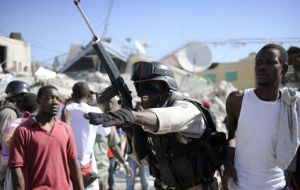MercoPress. South Atlantic News Agency
For many Port-au-Prince residents, situation is catastrophic says Red Cross
 Armed guards and police try to regulate the flow of customers with little success.
Armed guards and police try to regulate the flow of customers with little success. “Access to shelter, sanitation, water, food and medical care remains extremely limited,” said Riccardo Conti, the International Committee of the Red Cross, CRC head of delegation in Haiti.
“Even if the presence of aid agencies is starting to be felt in hospitals and clinics, many medical facilities in Port-au-Prince still lack staff and medicine. Given the scale of the needs, the task facing humanitarian organizations is daunting.”
In Christ-Roi, Delmas, Carrefour and nearly all other areas of the city, the streets are packed with people, makeshift tents and piles of burning trash. For many residents, the search for dead bodies seems to be over. Men sit on top of collapsed buildings, breaking apart cement blocks and pulling sheets of scrap metal from the rubble in an attempt to salvage whatever can be put to use. Long, chaotic lines are forming at the few petrol pumps that still work. Armed guards and police try to regulate the flow of customers with little success.
The ICRC is continuing to strengthen its response to the crisis and is now providing water in three areas of the city. Six truckloads of ICRC relief supplies, including medical items, arrived in Port-au-Prince on Sunday night, immediately boosting the organization’s capacity to help those in need.
Six days after the quake, the health and sanitation situation is growing increasingly precarious in the makeshift camps. With virtually no infrastructure or services left and vast numbers of people sleeping in the streets, the availability of toilets and fresh water is extremely limited. All over Port-au-Prince, the stench of urine is overpowering.
“We must rapidly address this water and sanitation issues if we want to minimize the risk of an outbreak of disease,” said Mr Conti. “This is really paramount.”
The ICRC is now using water trucks to provide clean water for around 7,500 people in three makeshift camps. Latrines for around 1,000 people have also been built in the Delmas area.
“Water does not merely quench thirst,” said Guy Mouron, the ICRC's water and sanitation coordinator in Haiti. “Being able to wash helps maintain hygiene and helps restore dignity when you have lost everything.”
Prices for food and transport have skyrocketed since last Tuesday and incidents of violence and looting are on the rise as the desperation grows.
ICRC delegates say there are vegetable and fruit vendors in the streets, but few customers because no one can afford to buy the food. In one Port-au-Prince neighbourhood, the price of bread has doubled since last week.
Many people who have enough money to do so are going away. Buses in Martissant are packed with people leaving the city, while the border with the Dominican Republic is reportedly jammed with Port-au-Prince residents trying to get out. Near the airport, Haitian-Americans are lining up in front of the US embassy, trying to leave the country.
Meanwhile, inside Port-au-Prince, indifference is setting in. People have begun dropping dead bodies in front of doors. “Along the Route des Frères last night, I saw people burning bodies in an improvised grave on the side of the street,” one woman told the ICRC.
The ICRC, which was already present and active in Haiti before Tuesday's earthquake, works as part of the wider International Red Cross and Red Crescent Movement and cooperates closely with the Haitian National Red Cross Society.
In addition to providing clean water for around 7,500 survivors, the ICRC has provided items to the Haitian Red Cross for the 10 first-aid posts it has set up in various makeshift camps around the city. The posts are now operational and are expected to provide basic care for thousands of patients.
The ICRC has also provided over 500 body bags to the Brazilian UN mission in charge of body removal in Port-au-Prince.
Prior to the arrival of six trucks carrying nearly 40 tonnes of ICRC relief supplies on Sunday, the organization had already supplied medical kits for the treatment of 2,000 patients to two Port-au-Prince referral hospitals with support form the Haitian Red Cross. Hundreds of blankets and plastic sheets had also been distributed.




Top Comments
Disclaimer & comment rulesCommenting for this story is now closed.
If you have a Facebook account, become a fan and comment on our Facebook Page!